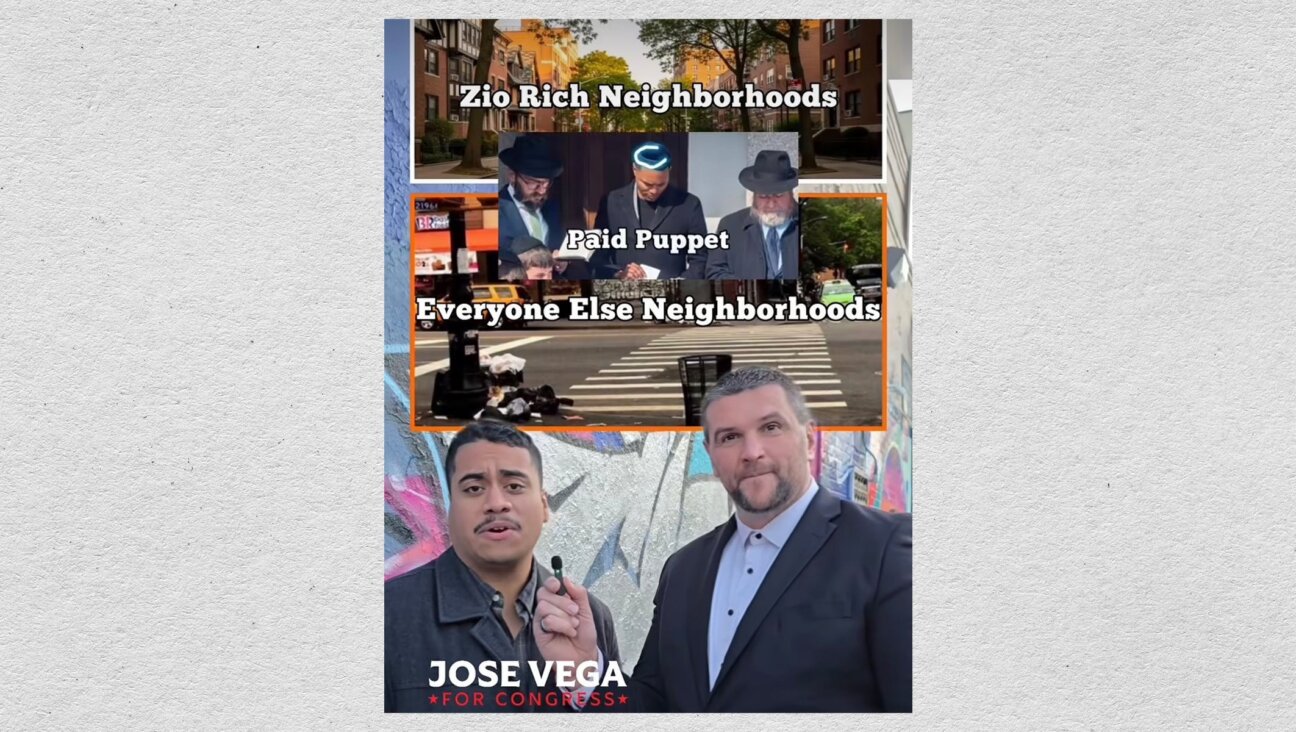Benjamin Netanyahu Rebuked by Rabbi for French Emigration Plea

Race to Front? Benjamin Netanyahu links arms with leaders at Paris anti-terror march. Did the Israeli leader’s aides shove him into the front row for photos to be beamed worldwide? Image by getty images
(Reuters) — Israeli Prime Minister Benjamin Netanyahu managed to ruffle a few feathers while taking part in the “Charlie Hebdo” rally in Paris on Sunday, an event his office initially said he would not be attending for security reasons.
Perhaps most awkward was his invitation to French Jews – alarmed by the Paris attacks and the killing of four people at a kosher supermarket – to migrate to Israel if they wanted, leaving French Prime Minister Manuel Valls scrambling to reassure the community it was safe and an integral part of France.
Rabbi Menachem Margolin, the head of the European Jewish Association, was particularly stern, saying Aliyah – the process of Jews migrating to Israel – was not the answer to everything, even if it was an important policy for the state of Israel.
“Anyone familiar with the European reality knows that a call to Aliyah is not the solution for anti-Semitic terror,” he said.
Only a small number of French Jews move to Israel each year – last year 7,000 out of the 550,000-strong community. But that number is expected to rise to 10,000 in 2015, in part because of last week’s attacks. Helping more of the Jewish diaspora migrate to Israel remains a central policy of the right-wing government, which faces elections in March.
Netanyahu’s “move to Israel” rhetoric was in fact no different to what he frequently says on the topic. But coming on the day of a three-million-person march designed to show the world standing as one with France, it came across as divisive.
It wasn’t the only uncomfortable episode.
A video posted on Facebook, the news footage mockingly set to the Looney Tunes cartoon music, showed Netanyahu maneuvering his way to the front of the rally with the help of several bodyguards, allowing him to be photographed arm-in-arm with other leaders, including French President Francois Hollande and German Chancellor Angela Merkel.
FRONT ROW
Those pictures were quickly posted on Netanyahu’s Twitter feed, while the banner on his Facebook page was changed to a photograph of him in the front row, shoulder-to-shoulder with Hollande, Merkel, Malian President Ibrahim Boubacar Keita and EU leaders Jean-Claude Juncker and Donald Tusk.
Not shown in the picture was Palestinian President Mahmoud Abbas, who was standing alongside Tusk, six feet (two meters) from Netanyahu. The two broke off peace talks last April and tensions between them have risen since, with Netanyahu accusing Abbas of inciting violence against Israelis.
The irony is that neither Netanyahu nor Abbas initially planned to be in Paris.
Sources in Netanyahu’s office said that in a phone call on Friday evening an adviser to Hollande had suggested it would be “complicated” and “uncomfortable” if the Israeli leader attended the Sunday march, largely because of security concerns.
As a result, the first word was that Netanyahu would not go. Around the same time, Abbas’s office said he also would not be attending because of bad weather.
But then it emerged Israeli Foreign Minister Avigdor Lieberman and Economy Minister Naftali Bennett, both leaders of far-right nationalist parties and both gearing up for the March 17 elections, were going of their own accord.
It is not clear when the situation changed, but by Saturday evening Netanyahu had decided he would attend, and shortly afterwards Abbas said he had been invited too. Asked in Paris on Monday about the back-and-forth, Netanyahu played it down.
“It was important I come here and therefore I did,” he said, adding that security had been the initial hurdle. On Sunday evening, he spoke at the main synagogue in Paris, an event that Hollande pointedly left before Netanyahu began his speech.
While the images on Facebook and Twitter are likely to buoy Netanyahu domestically, despite some criticism of his gauche behavior, going to Paris served Abbas less well. He has been vilified on social media and in newspaper cartoons for going to the French capital rather than visiting Gaza, which he has not been to since before last summer’s war with Israel.














